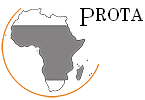
The following information about conditions of use applies to all Web pages (www.prota.org) and all information in the Web database PROTA4U (www.prota4u.info) managed by Plant Resources of Tropical Africa (PROTA), unless differently specified.
All texts are licensed under a Creative Commons Attribution-Noncommercial-Share Alike 3.0 Netherlands License
This license does not include the illustrations (maps, drawings, pictures); these remain all under copyright.
PROTA cannot be held liable for possible incorrectness, incompleteness and/or inaccuracy of the information on the domains www.prota.org and www.prota4u.info.
Use of this information is at the user's sole risk. Under no circumstances shall PROTA be liable for any direct, indirect, incidental, special or consequential damages, even if PROTA has been advised of the possibility of such damages.
Links and frames connecting this site with other sites are for convenience only and do not mean that PROTA endorses or approves those other sites or their content, nor can PROTA be held liable for the quality of the information.
PROTA can change the information on the PROTA website and Web database PROTA4U without prior notification. The information contained in this ‘Conditions of Use' can also be changed without notice, and you are bound by any such revisions.
If you wish to re-use any content for purposes other than those allowed by the associated Creative Commons license, you must get permission to do so from the copyright holder.
Illustration credits
To identify the terms of re-use of a photograph, map or drawing, click on the information button below the illustration. The illustration is either available under certain conditions under Creative Commons, or remains fully under copyright. If the last applies, please contact the copyright holder for re-use independent of the PROTA article it relates to.
Medical Information
PROTA does not provide specific medical advice, is not engaged in providing medical or professional services and does not endorse any medical or professional service or information obtained through or by any links to or from this site.
PROTA urges you to consult with a qualified physician for diagnosis and for answers to your personal questions. Use of the information on this site does not replace proper medical consultations with a qualified health or medical professional.
Traditional Knowledge and Intellectual Property Rights
Traditional Knowledge (TK)
Traditional knowledge refers to the knowledge, innovations and practices of indigenous and local communities around the world. Developed from experience gained over the centuries and adapted to the local culture and environment, traditional knowledge is transmitted orally from generation to generation. It tends to be collectively owned and takes the form of stories, songs, folklore, proverbs, cultural values, beliefs, rituals, community laws, local language, and agricultural practices, including the development of crops and animal breeds. Traditional knowledge is mainly of a practical nature, particularly in such fields as agriculture, fisheries, health, horticulture, forestry and post-harvest technologies.
Intellectual Property Rights (IPR)
Intellectual Property Rights regarding Traditional Knowledge are gradually internationally acknowledged. Many widely used products, such as plant-based medicines and cosmetics, agricultural and non-wood forest products as well as handicraft are derived from or based on traditional knowledge. Third party use of TK is governed by CBD guidelines on Access and Benefit Sharing. The issue of IPR is strongly related to patent law.
The PROTA Foundation will voluntarily apply the highest possible standards of compliance with the spirit of evolving norms regarding the protection of traditional knowledge (TK) and intellectual property rights (IPR).
PROTA aims to make a synthesis of published information, occasionally complemented with unpublished information covered by ‘prior informed consent'. A published document is defined as a document that can be accessed by the public as soft or hard copy through sale, rental, lease, lending or other transfer of ownership. PROTA authors and editors have the obligation to handle published information with care and make sure that the sources for their statements in the review articles appear in the References. ‘Reproducing' literally extended parts of source literature in the PROTA review articles is not in accordance with normal scientific practice and may violate copyrights.
Unpublished information is defined as information that has not been made public and is usually difficult to find. It includes personal knowledge (of uncertain origin) and information obtained by personal communication. PROTA authors and editors should not use unpublished information for their review articles, unless there is ‘prior informed consent' from the information owner (as evidenced by a written statement allowing its use for PROTA aims).

All texts are licensed under a Creative Commons Attribution-Noncommercial-Share Alike 3.0 Netherlands License
This license does not include the illustrations (Maps,drawings,pictures); these remain all under copyright.